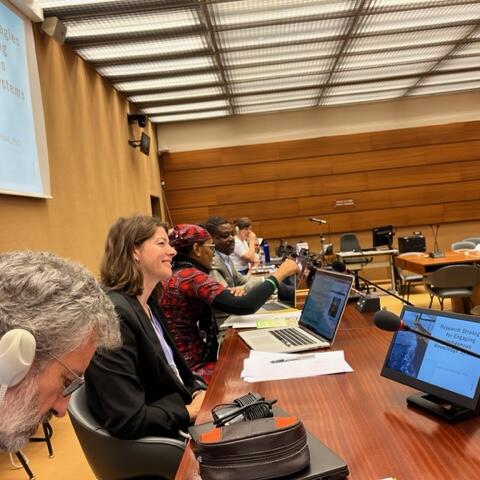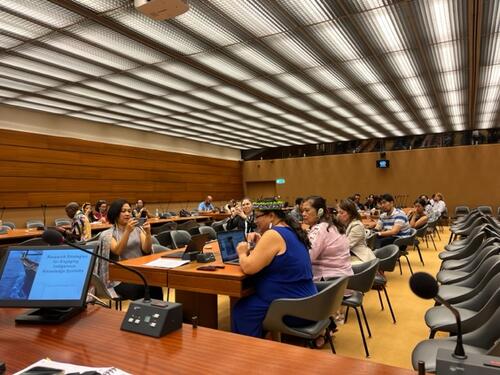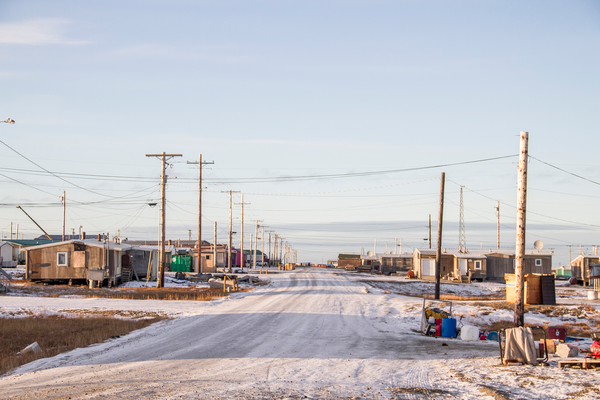
Understanding the intersections of climate change and Indigenous health and well-being
Waterloo researcher presents at the 16th session of the Expert Mechanism on the Rights of Indigenous Peoples

Waterloo researcher presents at the 16th session of the Expert Mechanism on the Rights of Indigenous Peoples
By Waterloo Climate InstituteDiverse knowledge and expertise are critical in understanding the intersections between health and climate change. Indigenous and local knowledge are fundamental in tackling this area of research and supporting the co-production of knowledge, bringing generations of wisdom, experience and practices to the discussion.
Waterloo researcher Dr. Laura Jane Brubacher presented at a side event to the 16th session of the Expert Mechanism on the Rights of Indigenous Peoples (EMRIP) on July 20 in Geneva, Switzerland. Established by the Human Rights Council, EMRIP advances the promotion and protection of Indigenous Peoples’ rights. The side event, organized by UNESCO's Local and Indigenous Knowledge Systems program, brought together Indigenous Peoples, scientists, policymakers, and organizations from across the globe to facilitate dialogue on experiences, lessons learned and approaches for bridging the gap between Indigenous Knowledge and scientific processes.

Dr. Laura Jane Brubacher presenting at EMRIP in Geneva, Switzerland
L to R: Tommaso Abrate, Laura Jane Brubacher, Aehshatou Manu, Vital Bambanze
Brubacher is part of an interdisciplinary research team supported by the Waterloo Climate Institute that was commissioned by the World Health Organization (WHO) to conduct the review, which explores the linkages between Indigenous health, environment, biodiversity and climate change, with gender considerations as a cross-cutting theme.
Along with Brubacher, other researchers leading this work include Dr. Hannah Tait Neufeld (Principal Investigator), Dr. Warren Dodd, Dr. Susan Elliott, Kaitlyn Patterson, Tara Chen, Laura Peach and University of Guelph professor Dr. Sheri Longboat.
The WHO also convened a global group of Indigenous experts who informed the research design and guided the research team's work.

Attendees at the side event at the 16th session of the EMRIP
Through the work with the WHO, Waterloo researchers are contributing to critical research on the intersections between climate change and Indigenous health and well-being. The WHO plans to use the review for its next general program of work to support member states’ work on climate change and health, and to feed into the health section of the forthcoming 2024 UNDESA State of the World's Indigenous Peoples (SOWIP) report.

Read more
New report calls on the UN to support Indigenous Data Sovereignty and governance

Read more
Waterloo professor is part of an emerging field that calls for establishing a governance framework for ocean-based climate interventions

Read more
Integrating Indigenous ways of thinking and making in all their work, Professor Jay Havens offers audiences, colleagues and students opportunities to learn and reciprocate
The University of Waterloo acknowledges that much of our work takes place on the traditional territory of the Neutral, Anishinaabeg, and Haudenosaunee peoples. Our main campus is situated on the Haldimand Tract, the land granted to the Six Nations that includes six miles on each side of the Grand River. Our active work toward reconciliation takes place across our campuses through research, learning, teaching, and community building, and is co-ordinated within the Office of Indigenous Relations.